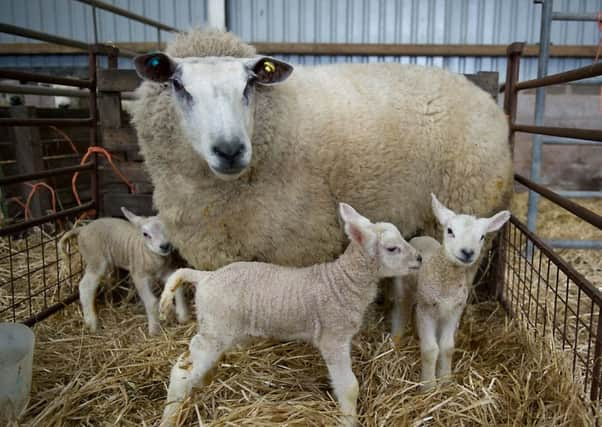Europe still vital post-Brexit for livestock producers
This article contains affiliate links. We may earn a small commission on items purchased through this article, but that does not affect our editorial judgement.


Speaking after the meeting, NFU Scotland Livestock committee chairman, Charlie Adam, who farms in Aberdeenshire, said: “Our livestock farmers, particularly sheep, need access to European markets to support our production and price while the quality of our beef merits trade arrangements that recognise existing and potential markets.”
His colleague from the English Union, Charles Sercombe, confirmed that not only was it essential the UK continued to have access to the European market but at the same time, it was vital discussions to secure access to new markets around the world continued.
Advertisement
Hide AdAdvertisement
Hide Ad“Agreements that allow access to the UK market must take into account the sensitive status of UK produced beef and lamb in future free trade or WTO discussions,” he said.
Sercombe also raised the issue of farm labour post the divorce from Europe. “Like other farming sectors, access to non-UK labour is a key issue,” he said. “We are acutely aware that the meat processing sector is reliant on a secure labour supply.”
Without this workforce, he believed there could be rises in costs. That, he warned, would have a knock on effect on the UK’s ability to compete in a world market.
The unions also raised the amount of paperwork now involved in livestock production and how it could be reduced, with Sercombe stating: “Regulatory burden remains a thorny issue for many livestock producers. We recognise that any significant change could impact on our ability to trade within the single market. Therefore, our challenge to government is to ensure regulation is proportionate, is not ‘gold plated’ but encourages compliance.”
• Scottish supermarkets are doing their bit in promoting the sale of Scotch Lamb, according to the latest store monitoring carried out by NFU Scotland.
Overall, out of 850 packs of lamb inspected on various supermarket shelves, less than 3 per cent was found to be imported, with home-produced lamb – labelled as either Scotch or British – accounting for over 97 per cent of sales.
With the peak lamb market approaching, the union described the findings as “a real success” for its dialogue with the retailers aimed at increasing the amount of Scotch Lamb on Scottish shelves.
Irish protests over grain imports
While currency fluctuations are currently slightly favouring cereal growers in this country, their colleagues in Ireland are mightily unhappy with their trade. Such is the seriousness of the situation that yesterday, their farm leaders warned that the Irish grain industry could be going into “terminal decline.”
Advertisement
Hide AdAdvertisement
Hide AdSpeaking at a protest rally at Drogheda, where boat-loads of grain are coming into the country and undermining the trade, Irish Farmers Association (IFA) president Joe Healy claimed there was a “deepening income crisis on many tillage farms”. In a letter to the Irish minister for agriculture, Michael Creed, the IFA have called for political intervention to prevent the industry from collapsing. These included the abolition of tariffs and anti-dumping duties on fertiliser imports.
The IFA also want a review by the EU Competition Authority of the cost of plant protection products, where they are priced significantly lower in other cereal growing regions across the world.
Addressing farmers who were protesting against grain imports at Drogheda, Healy claimed the future of grain farming in Ireland was at stake. He stated that current price offers for new crop grain were now significantly below the cost of production, which he estimated at €145-150 per tonne.
The chairman of the IFA grain committee, Liam Dunne, added: “The Irish cereal sector is in danger of falling into terminal decline unless immediate and decisive action is taken to reverse the dramatic fall in incomes.
“Since 2012, the Irish cereal area has fallen by over 100,000 acres and this trend will accelerate unless there is a dramatic turnaround in fortunes for grain growers. Irresponsible actions by the brokers/importers will accelerate the sector’s demise.”
